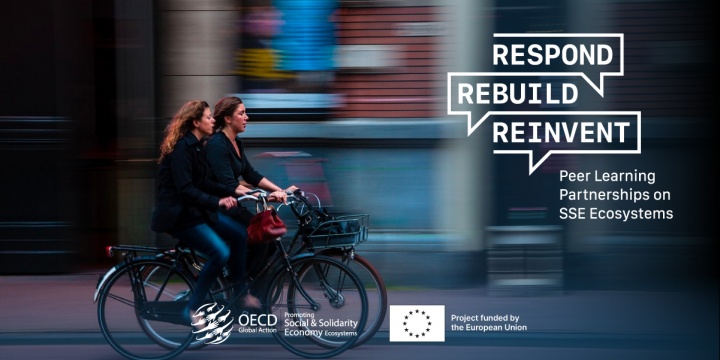
On June 29th, the Respond Rebuild Reinvent (RRR) consortium met with representatives from the 9 cities selected in April through the RRR Call for Peer Cities. The main objective of this first All-Peer meeting was to exchange and select the two COVID-19 challenges that will be the focus during the next steps of the project. The RRR project seeks to explore how to improve cross-sectoral collaboration with SSE ecosystems in local territories, while searching for specific solutions and social innovations provided by SSE ecosystems and social enterprises in relation to the two selected challenges.
Two specific challenges
Youth unemployment, and inclusion and support to vulnerable groups, the two challenges selected by the cities, will be at the center of the upcoming workshops. These were chosen among several other potential topics such as food security or just climate transition, all recognized by the cities as common challenges greatly impacted by the pandemic. Several city representatives mentioned that during the COVID pandemic, vulnerable groups suffered particularly. For example, people already isolated saw how their isolation increased; mental health issues, especially among children and youth, have risen sharply leading, in some cities, to an increase in the suicide rate amongst youngsters.
The first group, composed of Warsaw, San Francisco, Belo Horizonte and Montréal will exchange on inclusion and support to vulnerable groups, with a special focus on income inequality and migration.
Meanwhile, the other group, Bilbao, Torino, Dublin, Rotterdam and Guadalajara will exchange on youth unemployment and access to the labour market. “While unemployment was rather low in Dublin before COVID, during the pandemic, we have seen youth unemployment rate increased sharply” stated Mary Mac Sweeney, Deputy Head of Economic Development and Enterprise at Dublin City Council emphasizing that this issue will be a major point in the recovery process.
During the group exchanges, participants will contextualize the social problem in their territory, while also presenting some of the implemented responses by the city administration and the SSE Ecosystem to address the challenge. Additionally, transversal challenges, such as space for coordination and networks between those actors, digitalisation and use of technology, measurement and impact evidence or how to increase public awareness on SSE, will also by approached during the process.
Peer Cities exchange
The first All-Peer meeting was also the occasion to showcase some of the results of the onboarding interviews conducted during the month of June between the cities and their assigned RRR Consortium partners. In those meetings, RRR partners, met with its peer city to map the state of affairs of the SSE ecosystems in the territory, and investigate their level of interaction and collaboration with SSE actors.
While the results of those exchanges will be made public in October alongside the results of the project, the event allowed to share some inputs on best practices and recent developments. For example, to foster collaboration with SSE actors on specific issues representatives from the city of Montréal organized bi-weekly roundtable discussions, or the city of Rotterdam using social clauses in public procurement to oblige city contractors to provide employment opportunities to people furthest from the labour market, in a process also known as social return.
During the coming weeks, the two Challenge workshops will be organized, followed by the second All Peer Event where the conclusions of those workshops will be presented.